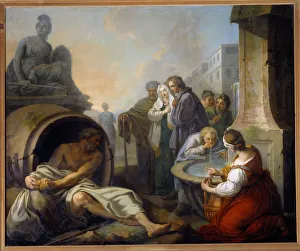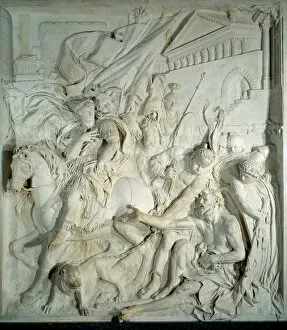413 V Collection
"413 v: The Encounter of Diogenes and Alexander the Great" In ancient Greece, during the 4th century BC
All Professionally Made to Order for Quick Shipping
"413 v: The Encounter of Diogenes and Alexander the Great" In ancient Greece, during the 4th century BC, two influential figures crossed paths in a moment that would be remembered for centuries to come. Diogenes of Sinope, also known as the Cynic philosopher, found himself face to face with none other than Alexander the Great. Diogenes, renowned for his unconventional lifestyle and disdain for societal norms, sat near his lantern on that fateful day. With a piercing gaze and an air of wisdom surrounding him, he challenged those who dared approach him. His search was not for material possessions or power; instead, he sought something far more elusive - an honest man. Alexander the Great, ruler of one of history's most formidable empires at such a young age, was intrigued by this enigmatic philosopher. He had heard tales of Diogenes' eccentricities and intellectual prowess and desired to engage in conversation with him. As they conversed under the watchful eyes of curious onlookers, it became apparent that these two men were polar opposites in their beliefs and values. While Alexander reveled in wealth and conquests, Diogenes lived humbly in a barrel without any desire for worldly possessions. Their encounter captured imaginations throughout time - from Pierre Puget's preparatory drawing depicting "Alexandre and Diogene, " showcasing their contrasting personas beautifully intertwined; to Nicolas Poussin's painting where Diogenes defiantly throws away his earthly belongings. The busts immortalizing Diogenes further emphasize his significance as a Greek philosopher who challenged societal conventions through cynicism. His quest for truth resonated deeply within philosophical circles even after his passing. In this historic meeting between two great minds - one driven by ambition while the other embraced simplicity - we witness an intriguing clash between different ideologies. It serves as a reminder that even amidst grandeur and power lies room for introspection and the pursuit of genuine human connection.













